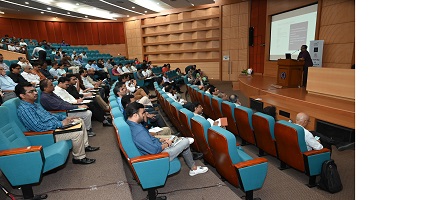The G&J Skill Council of India and Indian Institute of Technology conduct their premiere workshop on jewellery manufacturing solutions using AI

The Gems & Jewellery Skill Council of India or GJSCI in association with IIT-Bombay, Powai organised the First Workshop on the ‘Role of AI and IOT in Jewellery Manufacturing Processes for gem and jewellery manufacturers at the VMCC Auditorium of IIT’s Mumbai Campus at Powai. The session took place on October 7, 2022 from 9.30 a.m. upto 7.30 p.m. Dignitaries present on the occasion included Dr. Milind Atre who is the Dean Research & Development & Professor at Department of Mechanical Engineering IIT-B; Dr. Makrand Shrikrishna Kulkarni from the Department of Mechanical Engineering IIT-B, Dr. Asim Tiwari from the Department of Mechanical Engineering representing the Indian Institute of Technology. From the Gems & Jewellery Skill Council of India, Sanjay Kothari the Chairman of GJSCI and Rajeev Garg the ED & CEO of GJSCI were present along with several top jewellery manufacturers among others. The inaugural wishes were conveyed by Prof. Atrey who declared the event open which was followed by an introductory session delivered by Dr Sunita Sarawagi who is a Chair Professor of Computer Science and Engineering IIT-B. She gave a brief overview of C-Minds, the Centre of Machine Intelligence and Data Science at IIT Bombay.
Dr Atre said, “IIT Bombay is a 560 acre campus with nearly 13000 students out of which nearly 3700 are pursuing PhD’s, about 3700 pursuing engineering courses and about 4000 engaged in undergraduate studies. Out of the top 50 scoring students in Mumbai, 49 have joined IIT Bombay. As Dean R & D, I ensure engagement in relevant research, appropriate to society and applicable in real life. Gone are the days research was conducted in isolation. The rupee symbol has originated from our Intellectual Design Centre. We have a society of entrepreneurs called S.I.G.N. that has produced over 20 businessmen with over 500 crore turnover today. We work with an academic and industry focus. We are glad to associate with the gems and jewellery industry. This is our first such association with an industry body and we are happy and look forward to take this forward.” Dr Sunita Sarawagi said, “AIML or Artificial Intelligence and Machine Learning works on 4 broad goals; first is constructing a world-class academic programme, second creating an impact by sorting problems of public interest, third goal is industry collaboration (which has seen light of day today) and last but not least our outreach programme to connect with industry professionals. GJSCI is our first industry collaboration and we are very proud and hopeful about this venture."
Sanjay Kothari said, “It was during a symposium in 2019 that Dr Anand Deshpande introduced AI as a solution that could be applied to sort issues in jewellery manufacturing. We at GJSCI planned two meetings with top industry participation including WGC, PGI, GJEPC, De Beers and others. That’s when Sachin from De Beers said that with this kind of intellectual solution we could go from ‘mines to fingers’! That’s when GJSCI approached the GOI with a detailed proposal. The ministry of information and technology sponsored this programme through the IIT and that led us on to a pilot project. We have two pilots successfully running now – one with jewellery manufacturers and the other with jewellery retailers; results of which will be published by December this year.” Dr Asim Tiwari said, “Jewellery is essentially a combination of art and science. Aspects of design include the geometrics of shapes, the combinations of colours among many other aspects; but at the end of the day, when you have to manufacture the jewellery, it is all about engineering and science. This is where we can phenomenally impact the quality, cost and productivity of jewellery manufacturing process - and that is where AI plays a big role. Majority of gold jewellery is primarily made by casting – there are 10 different processes before you get a jewellery made! You have to polish it, then fine polishing, coating and the list is endless. These processes make it a complex process to be handled just based on the entire engineering domain – so that’s where AI plays an important role – so essentially the idea is to bring in AI along with the engineering domain knowledge to make the jewellery manufacturers improve their process for higher productivity, higher quality and lower costs. Data based information technologies and AI is the future of business enterprises and industries and very soon every industry will become data driven. Another aspect where we come in is in providing environmentally sustainable solutions.”
The first presentation on Industry 4.0 was made by Dr Makarand Kulkarni followed by a panel discussion on ‘The Future of Indian Jewelry Manufacturing’ moderated by Dr Asim Tiwari. Panelists included Mr. Rajeev Garg, Mr. Bobby Kothari, Mr. Rashesh Desai, Prof. Makarand Kulkarni, and Mr. Prassana V. of Uni Design. This discussion was followed by a visit to the digital factory twin IOT & Industry 4.0. The second session had three presentations namely ‘Gold Casting Technology’; ‘Gold Alloy Systems And AI’ and finally on ‘Physics Based ML In Casting Quality Improvement.’ These presentations were followed by QnA sessions.
Be the first to comment